You know how sometimes in book club the book you read was so benign that you find yourselves with nothing to talk about? Yea nope, that won’t be happening here. In this book, Adjei-Brenyah has taken a sword (hammer, whip and sauce pan) to the prison industrial complex and shredded it to pieces. He’s presented complicated character motivations, a brutal dystopic set-up, and a tangled mess of ethical contradictions.
You will certainly not be at a loss for topics to discuss. But we’ll help you get started with these Chain Gang All-Stars book club questions. Our discussion guide will help you explore the book’s views of the business of incarceration, the cognitive dissonance of brutal entertainment, civil rights vs punishment, the barbarism of death, and corporate greed.
In addition to 10 Chain Gang All-Stars book club questions, the discussion guide also offers a synopsis of the plot, some selected reviews (do you agree or disagree with them?) and three related reads to add to your TBR pile.

(This article contains affiliate links. This means that if you choose to purchase, I’ll make a small commission.)
Chain Gang All-Stars Synopsis
(We always chose to provide the publisher synopsis because we feel that it’s worthwhile to discuss whether the official book description actually squared with your experience of the book.)
Chain Gang All-Stars, Nana Kwame Adjei-Brenyah
Loretta Thurwar and Hamara “Hurricane Staxxx” Stacker are the stars of Chain-Gang All-Stars, the cornerstone of CAPE, or Criminal Action Penal Entertainment, a highly-popular, highly-controversial, profit-raising program in America’s increasingly dominant private prison industry. It’s the return of the gladiators and prisoners are competing for the ultimate prize: their freedom.
In CAPE, prisoners travel as Links in Chain-Gangs, competing in death-matches for packed arenas with righteous protestors at the gates. Thurwar and Staxxx, both teammates and lovers, are the fan favorites. And if all goes well, Thurwar will be free in just a few matches, a fact she carries as heavily as her lethal hammer. As she prepares to leave her fellow Links, she considers how she might help preserve their humanity, in defiance of these so-called games, but CAPE’s corporate owners will stop at nothing to protect their status quo and the obstacles they lay in Thurwar’s path have devastating consequences.
Moving from the Links in the field to the protestors to the CAPE employees and beyond, Chain-Gang All-Stars is a kaleidoscopic, excoriating look at the American prison system’s unholy alliance of systemic racism, unchecked capitalism, and mass incarceration, and a clear-eyed reckoning with what freedom in this country really means from a “new and necessary American voice” (Tommy Orange, The New York Times Book Review).
10 Chain Gang All-Stars Book Club Questions
These questions have been tailored to this book’s specific reading experience, but if you want more ideas, we also have an article with 101 generic book club questions.
- The book’s opening epigraph says, “I hope the universe loved you today” (Kendrick Lamar). Why do you think that the author chose this quote. What does it say about the story to come?
- The book offers frequent footnotes with factoids about the prison system. Why did the author choose to put them in? Did they add value to the story? Were they distracting? What did the factoids teach you about the American prison system?
- Rookie, Survivor, Cusp, Reaper, Harsh Reaper, Colossal, Grand Colossal, Freed.
Progressing through the levels is almost a zero sum game and Thurwar is the only one to ever come close to truly earning Freed. Discuss how the structure of the games conspired to make progression nearly impossible. Do we have similar, nearly impossible hierarchical structures in our present society? - From one of the fans– “The games gave people, who let’s face it, didn’t deserve shit on a stick, a chance to live, to compete, to see the country, to be a hero even”
These characters were doing hard time for hard crimes. But do they not deserve at least some “shit on a stick”? Are the prisoners really being given a chance to live and be a hero? Or are the fans experiencing a form of group cognitive dissonance? - The book offers a barely concealed satire at the corporate sponsor names like: Wal-stores, Sprivvy Wireless, WholeMarket, McFood, and LifeDepot. What did the notion of corporate sponsorship add to the satirical elements of the novel? And which of these corporate entities do you frequent the most?
- In our society, what sorts of entertainment do we have that resemble the blood sport of Chain Gang All-Stars? Or put another way, could our current culture buy-into the notion of prisoner death games?
- “In total, Thurwar had amassed enough BP that, as far as people deprived of freedom were concerned, she lived well”.
An interesting point. But can you “live well” when you don’t have freedom? - Let’s take a look at the story arc for fan Emily. She starts out abhorring the violence and suffering through Wil’s ongoing mansplaining. But she ultimately gets sucked into the games, becoming just as much a fan as Wil. What does her experience say about the fanbase at large? Was her and Wil’s storyline critical to the novel?
- When you learned that Staxxx killed Sunset, what did you initially think the reason was? And how did you respond when the full truth came out?
- So that ending then…was there any other way that it could have gone?
Selected Reviews for Chain Gang All-Stars
” […] Although our incarceration rate leads the world, we’re inured to the irony that the land of the free is also the empire of the jailed […] Make no mistake: Black lives matter to the prison industry […] (The book is) a devastating indictment of our penal system and our attendant enthusiasm for violence. Like Orwell’s “1984” and Atwood’s “The Handmaid’s Tale,” Adjei-Brenyah’s book presents a dystopian vision so upsetting and illuminating that it should permanently shift our understanding of who we are and what we’re capable of doing.”
“I think the book’s main weakness was the choice to flit around between so many characters. Thurwar and Staxxx were interesting to me; not all the others were. It is not surprising to hear that Adjei-Brenyah is primarily a short story writer, as some of the chapters seemed like short stories themselves and often took me out of the flow of the main storyline.”
“Jason Statham coming back from Death Race to compete with Jenifer Lawrence in Hunger Games (or the reverse) while Russel Crowe waiting impatiently with his gladiatorial armour on for his final contest. I was just expecting a gruesome bloodthirsty storyline but instead I’ve also found a beautiful overture to love, remorse, atonement, and hope. How can you keep your humanity amidst such physical and psychological carnage?”
“The character work is very minimal, with the priority being Thurwar and Staxxx, their fighting power, and their love for one another. Anyone outside of them was secondary, with some characters only coming into existence when the story needed them, their backstories rushed.”
3 Books Like Chain Gang All-Stars
For more on how incarceration affects lives, you can use our discussion guide for American Marriage (Tayari Jones). For more exploration on race, you can use our discussion guide for Caste (Isabel Wilkerson).
If you want more dystopic fiction on public policies gone terribly wrong, try our Our Missing Hearts discussion guide.
Or for female-centric stories of African Americans, try our guide for: Such a Fun Age (Kiley Reid), The Revisioners (Margaret Wilkerson Sexton), The Personal Librarian (Marie Benedict and Victoria Christopher Murray), Americanah (Chimamanda Ngozi Adichie), and Black Cake (Charmaine Wilkerson).

The Sellout, Paul Beatty
Like Chain Gang All-Stars, Beatty’s The Sellout uses an absurdist situation to spotlight civil rights and race.
The narrator Bonbon is an urban farmer in Dickens, which is on the southern edges of LA. His father was an eccentric sociologist who performed race experiments on Bonbon. After the police shoot his father to death (in sort of an accident??), LA tries to wipe its embarrassment by erasing the existence of Dickens.
Bonbon isn’t having it and so he embarks upon his own radical race experiment by taking a slave.
“It’s illegal to yell ‘Fire!’ in a crowded theater, right?” “It is.” “Well, I’ve whispered ‘Racism’ in a post-racial world.”

My Sister, the Serial Killer, Oyinkan Braithwaite
Ayoola has just offed her third boyfriend and (once again) she calls in her sister Korede to help with the mop-up. Ayoola keeps claiming self-defense but this is becoming just too much of a habit. Things get even more complicated when Ayoola starts dating a handsome doctor that Korede has a secret crush on, and the family dynamics become even more deadly.
The book takes a razor sharp satirical look at dysfunctional family dynamics, unlikable and yet remarkably sympathetic characters, sociopathy, and high order enablement.

The New Jim Crow, Michelle Alexander
(subtitle: Mass Incarceration in the Age of Color Blindness)
Chain Gang All-Stars surfaces the essential slavery of the prison system including: inhumane conditions, unpaid labor and loss of basic civil liberties.
Alexander examines the same issues in this non-fiction exploration of how the mass incarceration of Black men has made a lie of the alleged color-blindness of our criminal justice system. The book also explores how these felony convictions dog the formerly incarcerated into their “freed” status, preventing them from fully participating in society.
Have a listen on Audible. Try audio books for free for 30 days.
Share these Chain Gang All-Stars book club questions with your friends:

